Boost Your Immune System: The Best Nutritional Strategies
Introduction of Immune System
Immune system is the body’s complex defense mechanism that works to protect the body from disease and foreign invaders such as bacteria, viruses, fungi, and parasites. This system is based on an integrated system that includes different types of cells, tissues, and organs that work together to protect the body from these attacks.

Important parts of the immune system:
-
Immune cells:
These cells are the main part of the immune Health and include the following:
-
White Blood Cells:
These cells work against disease in the body and are also called leukocytes. They are present in the blood and find and kill disease germs.
-
Phagocytes:
They are a type of white blood cell that digests and destroys disease-causing germs in the body.
-
Lymphocytes:
These cells are primarily part of the body’s specific immune response against foreign invaders such as viruses and bacteria. These are of two types:
- B cells: make antibodies in the body, which produce an immune response against specific germs or viruses.
- T cells: destroy infected cells and control the immune response.
- Lymphatic System:
This system is an important part of the immune Health and circulates a fluid called lymph throughout the body. It includes the lymph nodes which help to trap and eliminate disease germs.
-
Spleen:
It is an organ in the body that cleans the blood and removes old or damaged blood cells.
-
Thymus:
This is the organ where T cells mature and prepare the body against disease.
-
Bone Marrow:
This is the part inside the bones where the immune cells are made.
-
Immune Response:
It is the immune system’s process by which the body recognizes and reacts to foreign invaders. This process involves two types of immune response:
-
Innate Immunity:
This immunity is activated as soon as the body is born and is non-specific, meaning it reacts immediately against all types of invaders. It consists of skin, mucus and various chemicals.
-
Adaptive Immunity:
This immunity develops during the body’s response to diseases and works specifically against specific invaders. B and T cells play an important role in this.
Important Functions of the Immune System:
-
Recognition:
The first job of the immune system is to identify foreign invaders such as viruses or bacteria.
-
Response:
The body’s response to and elimination of invaders.
-
Memory:
The immune Health remembers specific invaders so that it can respond quickly in the event of a repeat attack.
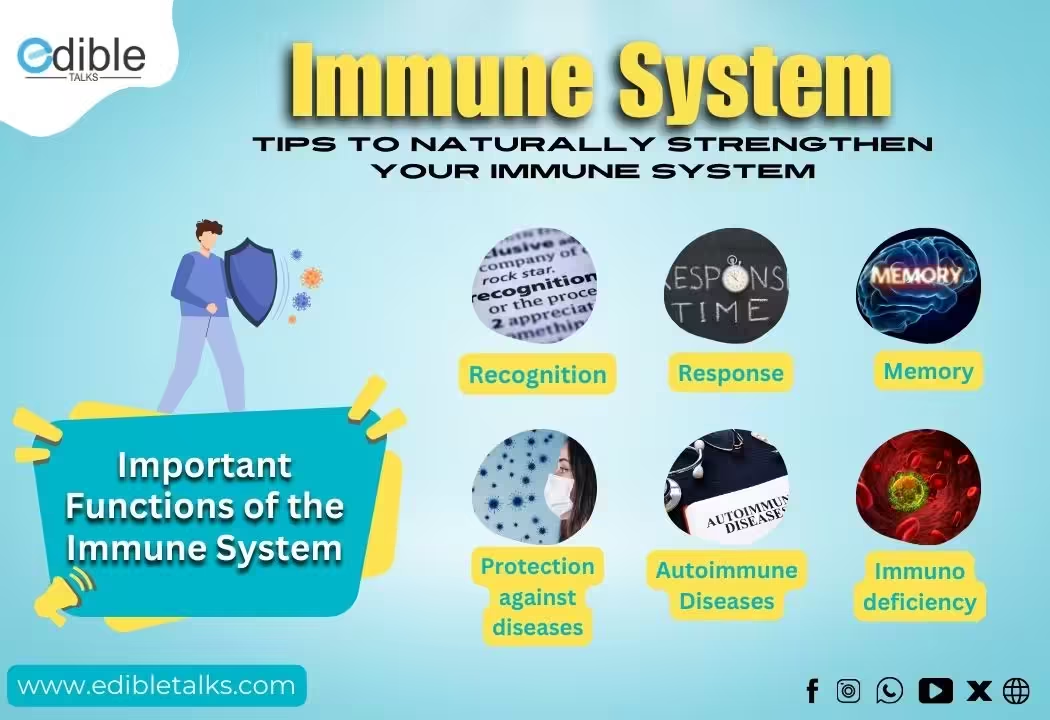
Protection against diseases:
If the immune Health does not work properly, the body can suffer from various diseases such as:
Autoimmune Diseases:
It causes the immune Health to attack the body’s own healthy cells, such as lupus and rheumatoid arthritis.
Immunodeficiency:
This occurs when the immune Health system does not work properly, such as HIV/AIDS.
Vaccines and the Immune System:
Vaccination is an effective way to train the immune system to fight disease. Vaccines help the body make antibodies against a specific disease without causing the disease, which protects the body against that disease in the future.
How the Immune System Works
Immune system is the body’s defense mechanism that protects against diseases and harmful germs. Its function is to protect the body against disease and keep the body healthy. The immune Health is a complex and dynamic system that recognizes and eliminates invading foreign substances such as bacteria, viruses, fungi, and other parasites.
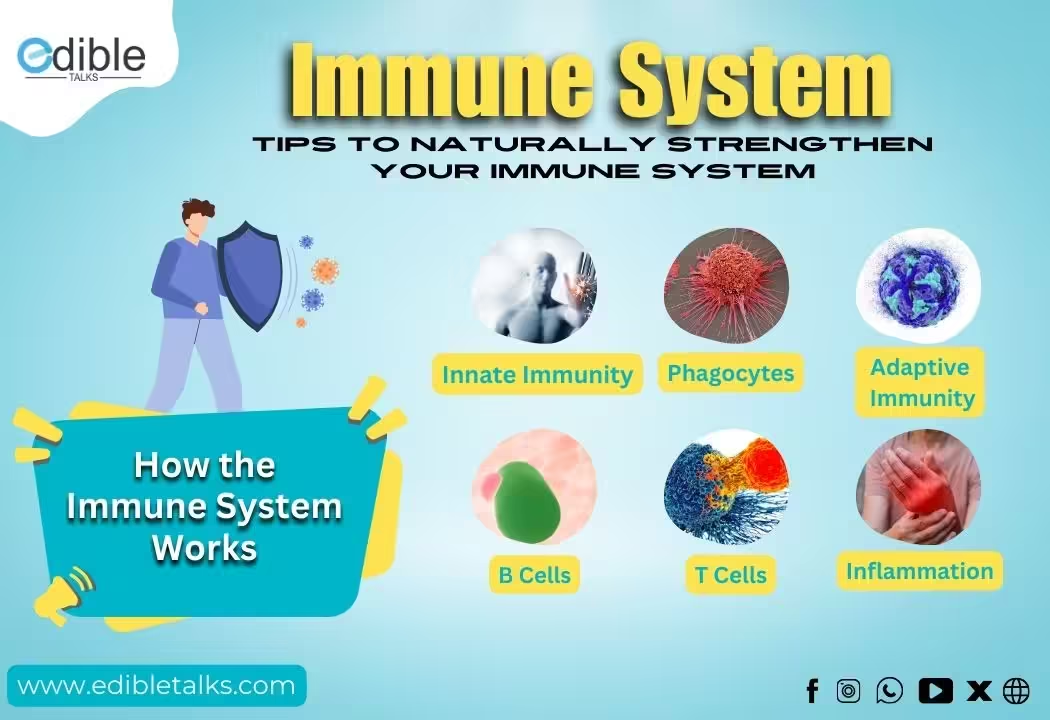
Immune Health system works:
The immune system consists of different stages and factors, and to understand its functioning the following stages can be described in detail:
Recognition of Foreign Invaders
When a foreign agent (such as a virus or bacteria) enters the body, the immune Health’s first step is to recognize it. This recognition is done by special cells and chemicals. Body cells contain special proteins that tell whether they are part of the body or come from outside. The immune Health recognizes the differences in these proteins and identifies the foreign components.
Innate Immunity
When a pathogen enters the body, the immune Health immediately activates innate immunity. This immune Health is non-specific, meaning it reacts quickly against all types of germs. It includes the skin, mucous membranes, and chemicals that help prevent and eliminate germs from entering the body.
Phagocytes:
These cells engulf foreign agents and digest them.
Cells like neutrophils and macrophages recognize and destroy foreign pathogens in the body.
Adaptive Immunity
If the foreign pathogen escapes the immediate immune response, the second phase of the immune system, adaptive immunity, begins. This system works against specific germs or viruses and B and T cells play an important role.
B Cells:
These cells make specific antibodies that target the germs and help kill them. B cells circulate in the blood and when they encounter a specific pathogen, they begin the process of making antibodies.
T Cells:
There are two main types of T cells:
- Helper T Cells: These cells activate B cells to make antibodies.
- Cytotoxic T Cells: These destroy infected cells or virus-infected cells.
Immunological Memory
When the immune system encounters a particular germ or virus once, it stores the memory of that germ. This process is done by memory cells, which react quickly in case of repeated attack of the same germ or virus in the future. In this way, the body gets a stronger defense against disease.
For example, if a person has chicken pox, the immune Health remembers the disease and reacts quickly to prevent the disease if it reoccurs.
Inflammation
When the immune system encounters a foreign agent in the body, the inflammatory process begins. Inflammation is part of the immune response in which white blood cells gather at the infected site and destroy the germs. During inflammation, the affected area may feel red, swollen, and warm, which is a sign of the body fighting the disease.
Regulation of the Immune System
The immune system needs to be controlled and balanced so that it works properly and does not damage its own cells. If the immune Health system becomes overactive, it can cause autoimmune diseases, in which the immune Health attacks its own cells. On the other hand, if the immune Health is weakened, the body can become susceptible to diseases.
Vaccines and the immune system
Vaccination is an important way to prepare the immune system against disease. Vaccines usually contain dead or weakened parts of viruses or bacteria, which prime the immune system against the disease. With the help of the vaccine, the body produces specific antibodies, which help prevent the disease in the future.
Immune system disorders
If the immune system does not work properly, a variety of diseases can occur:
Immunodeficiency:
When the immune Health is weakened, the body is no longer able to fight off diseases, such as HIV/AIDS.
Autoimmune diseases:
When the immune Health starts attacking the body’s own healthy cells, such as lupus or rheumatoid arthritis.
Factors that weaken the immune system
Immunosuppressive factors are factors that impair the body’s natural defense system and reduce its ability to fight disease and infection. These factors can weaken the immune Health by affecting different aspects of the body, due to which a person can suffer from various diseases. Factors that weaken the immune Health include:
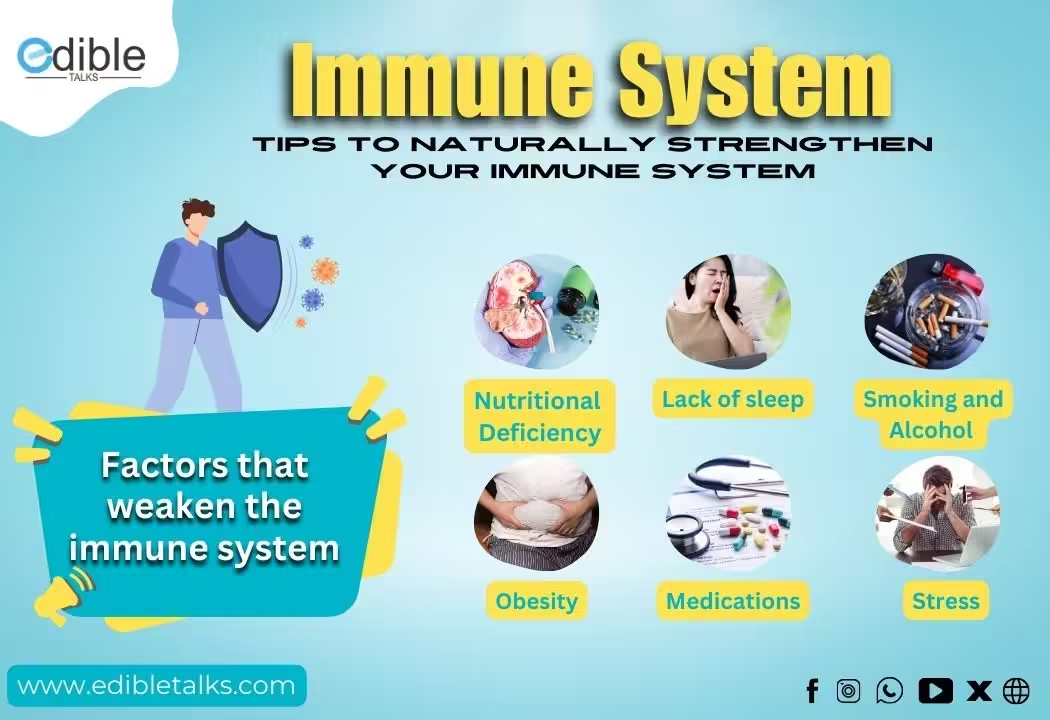
-
Nutritional Deficiency
Malnutrition is a major cause of weakened immune system. The body needs vitamins and minerals such as vitamin C, vitamin D, zinc, and proteins for the immune cells to function optimally. A poor or unbalanced diet depletes the body of these important nutrients, which slows down the immune response.
-
Lack of sleep
Sleep plays an important role in the body’s repair and recovery process. Chronic lack of sleep creates an imbalance in the body’s hormones and weakens the immune system, making it harder for the body to fight disease.
-
Stress
Constant stress and anxiety can weaken the immune system. When the body is under constant stress, hormones such as cortisol increase, which reduce the efficiency of immune cells. As a result, the body’s natural process of fighting diseases and infections is affected.
-
Smoking and Alcohol Consumption
Smoking and drinking alcohol directly damage the immune Health system. Chemicals in tobacco and alcohol weaken immune cells, increasing the risk of infection and disease. Alcoholism also affects vital organs such as the liver, which is an important part of the body’s natural defense system.
-
Obesity
Being overweight or obese can stress the immune system. Obese people are more likely to develop inflammation, which causes immune cells to become inactive and weaken the ability to fight disease. Obesity also often leads to other diseases such as diabetes and heart disease, which further weaken the immune Health system.
-
Diseases (Chronic Illnesses)
Chronic diseases such as diabetes, cancer, HIV/AIDS, and kidney or liver disease can weaken the immune system. These diseases affect different parts of the body and reduce the number and efficiency of immune cells, making the body unable to fight infections.
-
Aging
As we age, the immune system weakens. In the elderly, immune cells become less efficient, and the body loses its ability to respond effectively to disease. This is the reason why elderly people are more prone to various diseases and infections.
-
Medications
Some drugs, especially immunosuppressive drugs used to treat cancer or autoimmune diseases, can weaken the immune system. These drugs block the efficiency of the immune cells to weaken the body’s defense mechanism, making the patient susceptible to various infections.
-
Lack of physical activity
Lack of physical activity can weaken the immune system. Regular exercise activates immune cells in the body and improves blood circulation, which increases the body’s natural defenses. Lack of exercise slows down the body and weakens the immune system.
-
Poor Hygiene
Without proper hygiene, germs, bacteria, and viruses can attack the body more easily. The body needs more energy to fight these attacks and it puts an extra burden on the immune system, making it weaker.
-
Dehydration (Dehydration)
Dehydration in the body can also have negative effects on the immune system. Water helps flush toxins from the body, repair cells, and improve blood circulation. When the body is dehydrated, the immune cells are weakened.
-
Sleep Disturbances
Poor quality or insufficient sleep adversely affects the performance of the immune system. During sleep, the body repairs and restores itself, and if this process is not done properly, the body’s defense system can be weakened.
How to Strengthen Your Immune System Naturally
How to Strengthen Your Immune System Naturally strengthening the immune system is extremely important for our overall health. A strong immune Health system protects the body from various diseases, viruses, and bacteria. To boost the body’s natural immunity, it is important to adopt certain habits and lifestyle that can improve the immune Health system.
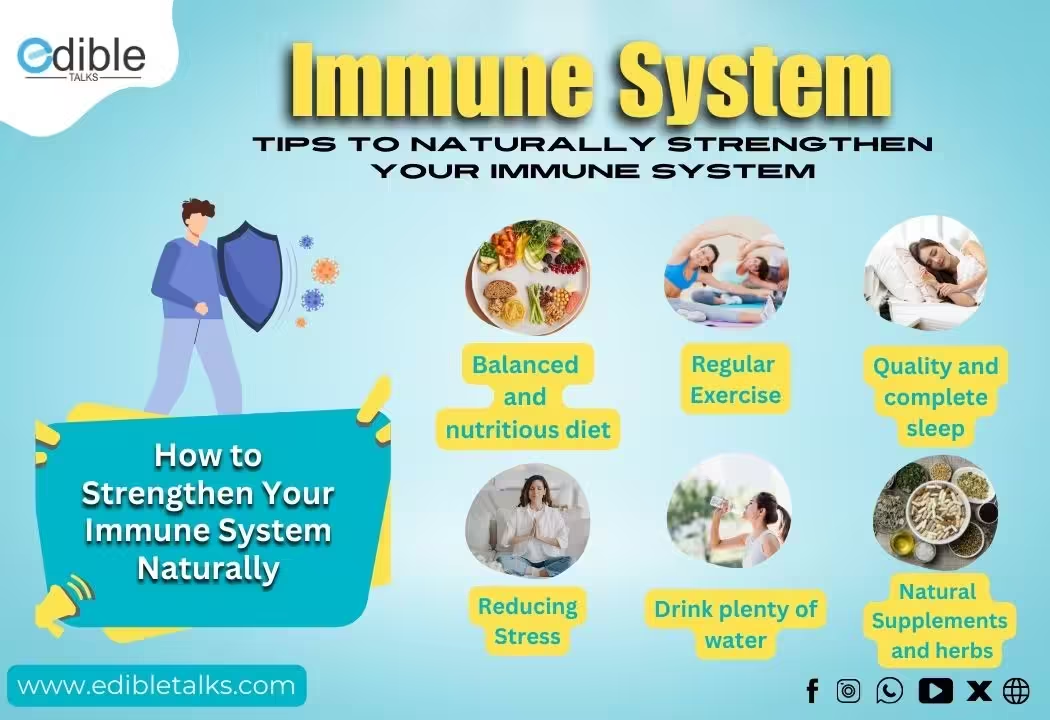
-
Eating a balanced and nutritious diet
A nutritious diet plays an important role in strengthening the immune system. A variety of vitamins and minerals support the immune system:
- Vitamin C:
Vitamin C strengthens the immune system and acts as an antioxidant. It is found in oranges, lemons, kiwis, and strawberries.
- Vitamin D:
Vitamin D activates immune cells and helps fight infection. It is found in soy, fish, egg yolks and fortified milk.
- Zinc:
Zinc improves the body’s immune response and helps in the development of immune cells. It is found in fish, meat, seeds and nuts.
- Protein:
Protein plays an important role in building immune cells and helps the body fight diseases. The best sources of protein are meat, eggs, pulses, and dairy products.
High consumption of vegetables and fruits increases the level of antioxidants in the body, which improve the performance of immune cells.
-
Regular exercise
Exercise is very beneficial for the overall health of the body and strengthens the immune system. Regular physical activity improves blood circulation, allowing immune cells and essential nutrients to circulate better throughout the body. Exercise reduces inflammation and keeps immune cells active.
30 minutes of daily exercise such as walking, jogging, yoga, or cycling can help improve the immune system.
-
Quality and complete sleep
Sleep plays an important role in the body’s repair process and the maintenance of immune cells. While you sleep, the body produces infection-fighting cells and proteins (cytokines). Lack of sleep weakens the immune Health system and can make the body susceptible to diseases.
7 to 8 hours of sleep daily helps in strengthening the immune system.
-
Reducing stress
High stress has negative effects on the immune system and increases the risk of diseases. In case of constant stress, the hormone cortisol is produced in excess, which weakens the efficiency of immune cells.
Relaxing activities such as yoga, meditation, deep breathing exercises, and taking time to relax can help the body de-stress.
-
Drink plenty of water
Water is essential for every system in the body and helps flush out toxins from the body. Dehydration can affect the performance of immune cells, so it is important to keep the body hydrated.
Drinking 8 to 10 glasses of water daily improves the immune system of the body.
-
Use of natural supplements and herbs
Some natural supplements and herbs can help strengthen the immune system:
- Garlic:
Garlic has antibacterial and antiviral properties, which strengthen the immune Health system.
- Ginger:
Ginger has anti-inflammatory properties, which improve the immune system.
- Honey:
Honey has natural antioxidant and antibacterial properties, which are beneficial for the immune system.
- Echinacea:
It is an herb that helps strengthen the body’s natural defenses and provides protection against infection.
-
Abstaining from smoking and drinking alcohol
Smoking and heavy drinking can seriously damage the immune system. The toxins in tobacco weaken the immune cells and alcohol consumption affects the body’s immune Health system. By giving up these habits, the immune Health system can be improved.
-
Maintain cleanliness and hygiene
It is important to pay attention to cleanliness and hygiene to protect the body from diseases:
- Regular hand hygiene:
Regular hand washing is an important way to prevent disease-causing germs.
- Take Care of Cleanliness:
Keeping your surroundings clean and taking proper precautions to prevent germs keeps your immune system healthy.
-
Keeping weight under control
Maintaining a healthy weight is very important for the immune system. Being overweight or obese affects the body’s immune cells and can increase inflammation, increasing the risk of infection. Keeping weight under control through a balanced diet and exercise strengthens the immune system.
-
Access to natural light and fresh air
Sunlight is a natural source of vitamin D in the body, which is essential for the immune system. Spending some time in the sun every day helps the immune cells to work better.stem Naturally
Myths and Facts About the Immune System
Various myths and misconceptions about the immune system are common that mislead people and create misconceptions about how to improve their immune system. It is important to know the truth about these myths so that we can better understand and protect our immune system.
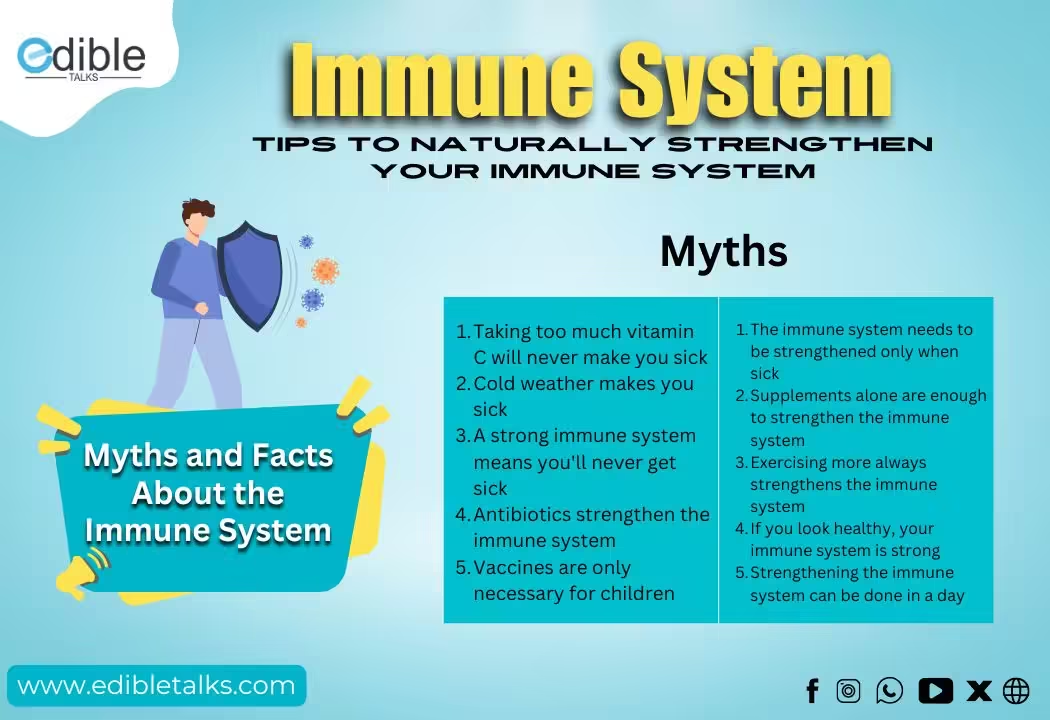
-
Myth: Taking too much vitamin C will never make you sick.
- Fact:
Vitamin C plays an important role in supporting the immune system, but excess vitamin C alone does not guarantee complete protection against disease. It is true that vitamin C improves immune cells, but other factors such as a balanced diet, adequate sleep and exercise are also important for the immune system. Taking vitamin C can shorten the duration of infection, but it may not prevent the disease completely.
-
Myth: Cold weather makes you sick.
- Fact:
The cold itself doesn’t make you sick, but people stay indoors more often in cold weather, which increases the spread of viruses and bacteria. Viral infections such as flu and colds are more common in cold weather, but these are not caused by the weather, but by the virus causing the infection. It is important to adopt healthy habits during the cold season to keep the immune system strong.
-
Myth: A strong immune system means you’ll never get sick.
- Fact:
A strong immune system gives you better protection against infections and diseases, but it doesn’t mean you’ll never get sick. The immune system helps fight disease, but the body can occasionally encounter infections and viruses. Getting sick is not a failure of the immune system, but rather a natural process during which the body responds to disease.
-
Myth: Antibiotics strengthen the immune system.
- Fact:
Antibiotics are used to treat bacterial infections, but they do not strengthen the immune system and are not effective against viral illnesses such as colds and flu. Unnecessary use of antibiotics can damage the immune system and create antibiotic resistance in the body, making it harder to treat infections.
-
Myth: Vaccines are only necessary for children.
- Fact:
Vaccines are important for people of all ages, especially adults and seniors whose immune systems can weaken over time. Vaccines help the body develop an immune response against specific diseases. Children can be protected from various diseases by vaccination, but vaccines are also important for the elderly, such as the flu vaccine or the pneumonia vaccine.
-
Myth: The immune system needs to be strengthened only when sick.
- Fact:
Strengthening the immune system should always be an effort, not just when you are sick. A healthy lifestyle, balanced diet, exercise, sleep, and stress management keep the immune system in good shape, reducing the risk of disease.
-
Myth: Supplements alone are enough to strengthen the immune system.
- Fact:
Supplements can help support the immune system, but they cannot completely replace a balanced diet and healthy habits. The most important things to keep the immune Health system strong are a nutritious diet, adequate exercise, sleep, and a healthy lifestyle. Relying on supplements alone may not improve overall immune Health system.
-
Myth: Exercising more always strengthens the immune system.
- Fact:
Exercise is good for the immune system, but too much exercise or intense exercise can also damage the immune system. Moderate exercise, such as a daily walk or light exercise, improves the immune Healthsystem, but too much vigorous exercise can tire the body and weaken the immune system.
-
Myth: If you look healthy, your immune system is strong.
- Fact:
Physical health and a strong immune system are not always correlated. Some people appear healthy, but their immune systems may be weakened, especially if they are under constant stress, sleep deprivation, or malnutrition. In order to maintain a strong immune system, it is important to pay attention to external health as well as internal factors.
-
Myth: Strengthening the immune system can be done in a day.
- Fact:
A strong immune system is the result of consistently adopting healthy habits over time. The immune system cannot be strengthened in one day through diet, supplements or other habits. Eating a regular, balanced diet, getting adequate sleep, exercising, and managing stress are essential for a strong immune system.
The Role of Supplements in Immune Health
Dietary supplements can play an important role in improving immune health, especially when the body is not getting adequate amounts of essential vitamins and minerals from the diet. Supplements can help support the immune system, increase the body’s resistance to disease, and improve the performance of immune cells. However, it is important to remember that supplements are not a substitute for a balanced diet and healthy lifestyle, but are used as an adjunct.
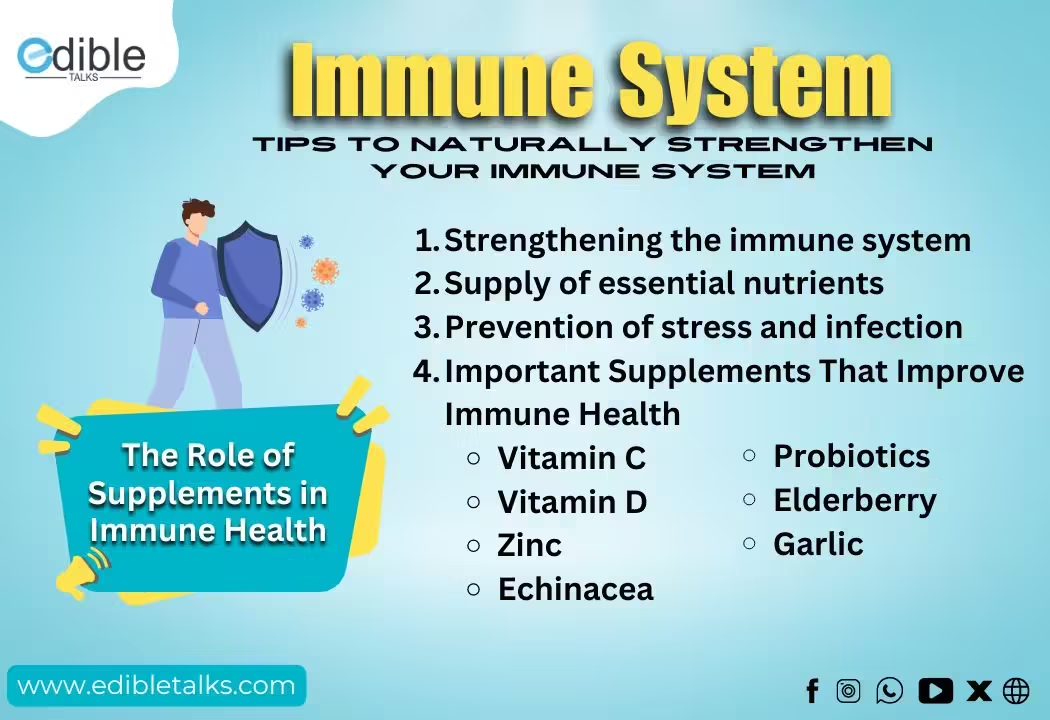
Key Benefits of Supplements in Immune Health:
-
Strengthening the immune system:
Some supplements help immune cells work better, increase levels of antioxidants in the body, and reduce inflammation.
-
Supply of essential nutrients:
Supplements can provide vitamins and minerals that cannot be found in the daily diet, especially if there is a deficiency in the diet or a change in dietary habits.
-
Prevention of stress and infection:
Certain supplements help the body cope with daily stress and strengthen the immune system against infections.
Important Supplements That Improve Immune Health:
-
Vitamin C
-
Advantage:
Vitamin C is a powerful antioxidant that protects immune cells from damage and increases the body’s production of white blood cells, which help fight infection.
-
Sources:
If vitamin C is not obtained from food, it is beneficial to take it in supplement form. It is usually available in the form of pills, powder, or gummy supplements.
-
Vitamin D
-
Advantage:
Vitamin D is essential for the proper functioning of the immune system. Its deficiency can increase the risk of infections, especially respiratory diseases. Vitamin D stimulates immune cells, which fight infection.
-
Sources:
Sunlight is a natural source of vitamin D, but if it is deficient, supplements are helpful. Vitamin D3 supplements are considered more effective.
-
Zinc
-
Advantage:
Zinc helps regulate the immune response in the body and enhances the function of immune cells during infection. It also plays an important role in strengthening immunity against viruses and bacteria.
-
Sources:
Zinc supplements are available in different forms, such as zinc gluconate, zinc sulfate, and zinc acetate. Zinc supplements are considered effective in the common cold and flu.
-
Echinacea
-
Advantage:
Echinacea is an herb that is thought to help support the immune system and reduce cold symptoms. Research has shown that it can increase the activity of immune cells and reduce the severity of infections.
-
Sources:
Echinacea supplements are available in capsule, tea, or liquid form and are commonly used to support the immune system.
-
Probiotics
-
Advantage:
Probiotics are beneficial bacteria that live in the digestive system and improve the immune system. They improve intestinal health and help the body fight diseases.
-
Sources:
Probiotics are available in the form of yogurt, kimchi, and supplements. Probiotic supplements are especially beneficial during intestinal diseases and infections.
-
Elderberry
-
Advantage:
Elderberry is an antioxidant-rich herb that boosts the body’s immunity against illnesses such as colds and flu. It enhances the function of immune cells and reduces the severity of the disease.
-
Sources:
Elderberry supplements are available as syrups, tablets, or gummy supplements and are used to strengthen the immune system, especially in the winter.
-
Garlic
-
Advantage:
Garlic has natural antibacterial and antiviral properties that strengthen the immune system and protect against infections. Garlic supplement helps in increasing the body’s immunity against common diseases.
-
Sources:
Garlic supplements are available in capsule, tablet, or powder form.
How to use supplements correctly?
- To consult a doctor:
Before taking supplements, it is important to consult a doctor or nutritionist to know what supplement your body needs and in what amount.
- Use with a balanced diet:
Use supplements only as needed and try to get essential nutrients from natural foods. Supplements are intended to supplement nutritional deficiencies, not to replace food.
- Use in moderation:
Overdosing on supplements can be harmful, so always use them in the recommended amount. For example, high doses of vitamin D can cause toxic effects.
Special Considerations for Immune Health System
Taking care of the health and strength of the immune system is very important for human health. This system not only fights diseases but also maintains the health of different parts of the body. Here are some important tips by which you can take special care of your immune system.

-
Balanced diet
- Nutrients: Eat foods that are rich in vitamins, minerals, and antioxidants. Fruits, vegetables, whole grains, protein (such as pulses, fish, poultry) and healthy fats (such as olive oil, nuts) help strengthen the immune system.
- Hydration: Drinking adequate amounts of water is important. It helps all body systems to function better and also helps in the elimination of toxins.
-
Regular exercise
- Importance of Exercise: Regular physical activity strengthens the immune system. It improves blood circulation, increases the number of immune cells in the body, and reduces stress.
- Types: Make light exercise like walking, yoga, or cycling a daily habit. Try to get at least 150 minutes of light exercise each week.
-
Adequate sleep
- Importance of sleep: During sleep, the body repairs itself and produces hormones necessary to strengthen the immune system. Lack of sleep can weaken the immune response.
- Sleep habits: Try to get a good 7-9 hours of sleep daily and provide a relaxing environment before going to sleep, such as reducing mobile phone and computer use.
-
Taking care of mental health
- Stress: Constant stress can weaken the immune Health system. Meditation, yoga, and deep breathing exercises can be helpful in maintaining mental health.
- Social relationships: Maintain positive relationships with friends and family, as they help reduce stress and increase happiness levels.
-
Avoid unnecessary supplements
- Use of supplements: Although some supplements can be helpful, use them only as needed and under the guidance of a specialist. Vitamins and minerals obtained through food are more effective.
-
Regular health check-ups
- Medical check-ups: Regular health check-ups are important so that any disease or condition can be detected in time. If any symptoms appear, seek medical advice immediately.
-
Vaccination
- Importance of vaccines: Get vaccinated to prevent various diseases, such as flu, pneumonia, and other deadly diseases. They play an important role in improving the immune Health system.
-
Adopt healthy habits
- Smoking and alcohol: Avoid smoking and drinking too much alcohol. These habits weaken the immune system and increase the risk of diseases.
- Avoid processed foods: Avoid foods high in fat, sugar, and artificial ingredients, as these can affect the immune system.
-
Maintaining a healthy weight
- Weight Watch: Try to maintain a healthy weight, as excess weight can weaken the immune Health system. Maintain a healthy weight through a balanced diet and exercise.
-
Certain herbal and natural remedies
- Herbs: Certain natural herbs, such as garlic, ginger, and echinacea, can help boost immune Health system health. Include them in your daily diet.
Recommended Books About Immune System
“The Immune Health: A Very Short Introduction” by Paul Klenerman
- This book offers a concise yet comprehensive overview of the immune Health, making complex concepts accessible to general readers.
“An Elegant Defense: The Extraordinary New Science of the Immune Health” by Matt Richtel
- A well-written narrative that explores the complexities of the immune Health through scientific insights and human stories.
“The Beautiful Cure: The Revolution in Immunology and What It Means for Your Health” by Daniel M. Davis
- This book delves into the latest discoveries in immunology and how they are transforming our understanding of health and disease.
“How the Immune Health Works” by Lauren M. Sompayrac
- A highly readable introduction to the immune Health, using a conversational style to explain how it functions in health and disease.
Conclusion
- The immune system is a very important defense structure for the body that protects us from diseases and germs. Its correct performance is extremely important for the health of the body.
- To keep the immune Health strong and balanced, it is important to adopt a healthy lifestyle, eat a balanced diet, exercise regularly, get enough sleep, and manage stress. By avoiding these factors we can strengthen our immune Health and get better protection against diseases.
- To strengthen the immune Health, it is important to improve our lifestyle and diet. The immune Health can be strengthened by a balanced diet, regular exercise, sleep, and keeping stress under control. By improving the immune Health with these natural methods, we can protect ourselves from diseases and improve our overall health.
- It is important to understand the myths about the immune Health so that we can take better care of our bodies based on accurate information. With the right facts and information, we know better ways to strengthen the immune Health, which helps prevent disease and lead a healthier life.
-
Supplements can play an important role
- Supplements can play an important role in improving immune health, especially when there are nutrient deficiencies or in certain situations where the body needs extra support. Vitamin C, vitamin D, zinc, probiotics and other supplements can improve immune Health function, but they must be included with a balanced diet, exercise and a healthy lifestyle. Remember that moderation and expert guidance are essential when using supplements to strengthen the immune system.
- Taking special care of the immune Health is essential for living a healthy life. By eating a balanced diet, exercising regularly, getting adequate sleep, and taking care of your mental health, you can strengthen your immune Health. Adopting these habits not only helps in preventing diseases but also improves your general health. By following these tips, you can keep your immune Health in top shape.
Frequently Asked Questions (FAQs)
-
What is the immune Health?
- Answer: The immune Health is a complex network of cells, tissues, and organs that work together to defend the body against harmful pathogens like bacteria, viruses, and parasites. It identifies and neutralizes these threats to maintain health.
-
How does the immune Health work?
- Answer: The immune Health detects pathogens using specialized cells (like white blood cells) and molecules (such as antibodies). When a pathogen is recognized, the immune Health activates various responses, including inflammation and the production of antibodies, to eliminate the invader.
-
What are the different types of immunity?
- Answer: There are two main types of immunity:
- Innate Immunity: The body’s first line of defense, providing immediate but non-specific protection against pathogens.
- Adaptive Immunity: A specific response developed over time, involving memory cells that recognize and respond to previously encountered pathogens more effectively.
-
How can I strengthen my immune Health?
- Answer: You can strengthen your immune Health through a balanced diet rich in fruits and vegetables, regular exercise, adequate sleep, stress management, staying hydrated, and practicing good hygiene.
-
What foods boost the immune Health?
- Answer: Foods that boost the immune Health include citrus fruits (rich in vitamin C), garlic, ginger, spinach, yogurt (probiotics), almonds, and green tea, among others.
-
Does stress affect the immune system?
- Answer: Yes, chronic stress can weaken the immune system by releasing stress hormones that inhibit the immune response, making the body more susceptible to infections.
-
How does sleep impact immune health?
- Answer: Quality sleep is essential for a strong immune Health. During sleep, the body produces proteins called cytokines that help regulate immune responses. Lack of sleep can reduce the production of these proteins, leading to a weaker immune response.
-
Are vaccines effective for boosting the immune Health?
- Answer: Yes, vaccines are designed to stimulate the immune Health to recognize and fight specific pathogens, helping to prevent diseases. They prepare the immune Health to respond more effectively if exposed to the actual disease.
-
Can supplements improve immune function?
- Answer: Certain supplements, like vitamin C, vitamin D, and zinc, may support immune health, especially if dietary intake is insufficient. However, it’s best to get nutrients from whole foods whenever possible, and supplements should not replace a healthy diet.
-
What lifestyle changes can help improve my immune Health?
- Answer: To improve your immune Health, focus on a nutrient-dense diet, engage in regular physical activity, prioritize sufficient sleep, manage stress effectively, avoid smoking, and limit alcohol consumption.




